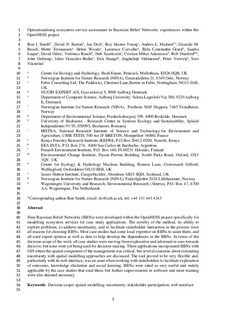| dc.contributor.author | Smith, Ron I. | |
| dc.contributor.author | Barton, David Nicholas | |
| dc.contributor.author | Dick, Jan | |
| dc.contributor.author | Haines-Young, Roy | |
| dc.contributor.author | Madsen, Anders L. | |
| dc.contributor.author | Rusch, Graciela | |
| dc.contributor.author | Termansen, Mette | |
| dc.contributor.author | Woods, Helen | |
| dc.contributor.author | Carvalho, Laurence | |
| dc.contributor.author | Giucă, Relu Constantin | |
| dc.contributor.author | Luque, Sandra | |
| dc.contributor.author | Odee, David | |
| dc.contributor.author | Rusch, Veronica E. | |
| dc.contributor.author | Saarikoski, Heli | |
| dc.contributor.author | Adamescu, Cristian Mihai | |
| dc.contributor.author | Dunford, Robert | |
| dc.contributor.author | Ochieng, John | |
| dc.contributor.author | Gonzalez-Redino, Julen | |
| dc.contributor.author | Stange, Erik | |
| dc.contributor.author | Vădineanuh, Angheluță | |
| dc.contributor.author | Verweijq, Peter | |
| dc.contributor.author | Vikström, Suvi | |
| dc.date.accessioned | 2017-12-07T11:51:27Z | |
| dc.date.available | 2017-12-07T11:51:27Z | |
| dc.date.created | 2017-12-06T10:10:13Z | |
| dc.date.issued | 2017 | |
| dc.identifier.issn | 2212-0416 | |
| dc.identifier.uri | http://hdl.handle.net/11250/2469543 | |
| dc.description.abstract | Nine Bayesian Belief Networks (BBNs) were developed within the OpenNESS project specifically for modelling ecosystem services for case study applications. The novelty of the method, its ability to explore problems, to address uncertainty, and to facilitate stakeholder interaction in the process were all reasons for choosing BBNs. Most case studies had some local expertise on BBNs to assist them, and all used expert opinion as well as data to help develop the dependences in the BBNs. In terms of the decision scope of the work, all case studies were moving from explorative and informative uses towards decisive, but none were yet being used for decision-making. Three applications incorporated BBNs with GIS where the spatial component of the management was critical, but several concerns about estimating uncertainty with spatial modelling approaches are discussed. The tool proved to be very flexible and, particularly with its web interface, was an asset when working with stakeholders to facilitate exploration of outcomes, knowledge elicitation and social learning. BBNs were rated as very useful and widely applicable by the case studies that used them, but further improvements in software and more training were also deemed necessary. | nb_NO |
| dc.language.iso | eng | nb_NO |
| dc.rights | Attribution-NonCommercial-NoDerivatives 4.0 Internasjonal | * |
| dc.rights.uri | http://creativecommons.org/licenses/by-nc-nd/4.0/deed.no | * |
| dc.subject | Decision scope | nb_NO |
| dc.subject | Spatial modelling | nb_NO |
| dc.subject | Uncertainty | nb_NO |
| dc.subject | Stakeholder participation | nb_NO |
| dc.subject | Web interface | nb_NO |
| dc.title | Operationalising ecosystem service assessment in Bayesian Belief Networks: experiences within the OpenNESS project | nb_NO |
| dc.type | Journal article | nb_NO |
| dc.type | Peer reviewed | nb_NO |
| dc.description.version | acceptedVersion | nb_NO |
| dc.subject.nsi | VDP::Samfunnsvitenskap: 200::Økonomi: 210 | nb_NO |
| dc.source.journal | Ecosystem Services | nb_NO |
| dc.identifier.doi | 10.1016/j.ecoser.2017.11.004 | |
| dc.identifier.cristin | 1523365 | |
| dc.relation.project | EC/FP7/OpenNESS (Grant agreement no. 308428) | nb_NO |
| cristin.unitcode | 7511,6,0,0 | |
| cristin.unitcode | 7511,2,0,0 | |
| cristin.unitcode | 7511,5,0,0 | |
| cristin.unitname | Oslo | |
| cristin.unitname | Avdeling for terrestrisk økologi | |
| cristin.unitname | Lillehammer | |
| cristin.ispublished | true | |
| cristin.fulltext | postprint | |
| cristin.qualitycode | 1 | |

